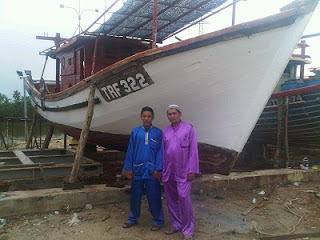 |
| Builder Jiman bin Haron sizing up his task for the renovation. |
We have just returned from from Besut in Terengganu state, having delivered the builder to the boat to work on renovations.
Jiman Bin Haron is an experienced professional and built the beds, wall cupboards and kitchen cabinets for my previous apartment. He also has plenty of experience building houses and other items. This is his first boat cabin and he is excited about the challenge.
We left him with the boat captain Yahya and his sidekick Zamri to start work on the rebuilding of the cabin. Ideally, we would have sleeping room for more than eight people, segregated for women and men if required and plenty of fishing room aft and fore, as well as on the sides.
Much of the day was spent looking for wood. We went to three sawmills before we found the correct wood for the cabin. The wood must be strong and also suitable for a marine environment, so that it doesn't rot easily when exposed to seawater.
The sticking point is where to put the bathroom. My preference is just behind the sleeping cabin aft with the entrance facing the side. However, Yahya said that would require cutting some heavy wood. Jiman suggested stern but that would affect the fishing area. We hope to come to a final decision soon.
 |
| The boat sits on the water in Kuala Besut jetty. |
We are also in the process of collecting items compulsory in order to obtain an angling license. These include at least 10 life vests, a fire extinguisher and spotlights for night fishing, among others.
Bookings have been coming in regularly, including families, mates banding together and individuals. Perhentian Island is already open and boats are ferrying tourists there. However, the fishing weather is still not ideal but, hopefully, towards the end of march the boats will start heading out.
To make sure you enjoy the fishing season off Malaysia's east coast, book with us now. Squid jigging is popular for the first three months from April to June while fishing is there throughout the season. Email fishingmalaysia@yahoo.com or call 0102250094.













